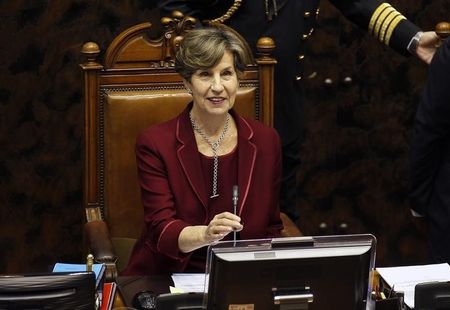By Rosalba O'Brien
SANTIAGO (Reuters) - Isabel Allende, the daughter of deposed Chilean president Salvador Allende, is "heading towards" running for leadership of the country's socialist party, she said, a role that would put her in prime position for an eventual shot at the presidency.
Isabel Allende (not the well-known author, who is a more distant relative) is currently the head of the senate. That role ends next year, and she is holding talks as to whether she should put her name forward for the socialist party leadership contest in April, she told journalists on Friday.
"Some (party members) feel my name is generating a certain consensus," she said. "I will have to make a decision (following talks)...I think things are heading that way."
Allende's name has appeared in local media in recent weeks as a possible candidate for the 2017 presidential elections, in which incumbent socialist President Michelle Bachelet is barred from running under Chile's constitution.
It was "premature" to talk about running for the presidency, said Allende, but she did not rule it out.
"There's three and a half years to go, and that's a very long time in politics. Time will tell," she said.
Other possible contenders include current Interior Minister Rodrigo Penailillo and ex-socialist party member and two times presidential candidate Marco Enriquez-Ominami.
RESONATING SURNAME
The Allende surname still resonates strongly in Chile, more than 41 years after Salvador Allende committed suicide in the La Moneda presidential palace rather than surrender to armed forces who had mounted a coup.
Salvador Allende was elected as president of Chile in 1970 at the height of the Cold War, at the head of the "Popular Unity" movement that sought a radical programme of nationalisation and land reform.
In the teeth of strong U.S. and conservative opposition his inexperienced government struggled, and three years later, his project in tatters, his government was overthrown in the coup, which ushered in 17 years of brutal dictatorship led by General Augusto Pinochet.
The events still deeply divide Chile, with some idolising Allende as a martyr and others criticizing him for bringing an end to long years of stability. With the passing years, however, polls show diminishing support for Pinochet and an increasing appreciation for Allende, who is revered by the vocal student movement and whose names figures on streets and schools throughout the country.
"The name of Salvador Allende keeps on growing in our country," said his daughter, who spent the dictatorship years in exile in Mexico.
"It touches me closely because of course people come up to me in the street to tell me - I remember. We will never forget," she said.
Allende, who also spoke passionately about the need to reform Chile's education system and Pinochet-era constitution, both pillars of Bachelet's programme, has had a long political career in Congress, which she joined on the return to democracy in 1990.

"Although I feel tremendously proud and emotional about my name, I have a trajectory, not just a name," she said.
(Reporting by Rosalba O'Brien; Editing by Lisa Shumaker)
